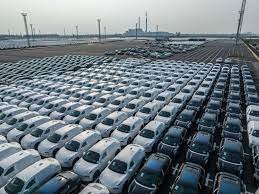President Joe Biden is poised to unveil a new set of tariffs targeting strategic sectors in China, including electric vehicles, in an announcement expected as early as next week, according to sources familiar with the matter.
The forthcoming announcement, potentially scheduled for Tuesday, is anticipated to maintain existing tariffs largely, although the timing might be subject to change, as per one insider.
Semiconductors and solar equipment are among the specific sectors to be targeted, according to insiders, although details regarding the precise scope and value of the tariffs remain unclear. The administration has reportedly prioritized areas within strategic competitive and national security realms.
Recommendations from the US Trade Representative’s office were submitted to the White House weeks ago, with the final decision delayed as internal deliberations continued.
Biden’s approach aims to distinguish itself from the previous administration’s strategy under Donald Trump, which favored broad-based tariffs viewed by White House officials as overly blunt and inflationary.
While Biden has emphasized his reluctance for a trade war with China, he acknowledges the heightened competition between the two nations.
Both Biden and Trump have departed from the traditional free-trade stance, reflecting a broader shift in Washington since China’s accession to the World Trade Organization in 2001.
In 2022, Biden initiated a review of Trump-era policies under Section 301 of US trade law. Last month, he proposed significantly higher tariffs on specific Chinese metal products, signaling a targeted approach.
Furthermore, the Biden administration launched an investigation into Chinese trade practices across various sectors, potentially paving the way for additional tariffs.
Pressure has also been exerted on Mexico to restrict indirect sales of Chinese metal products to the US.
China has criticized the tariff measures, labeling them counterproductive and harmful to both the US and global economy.



